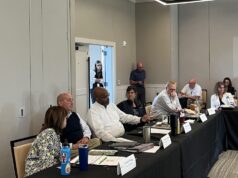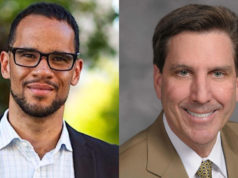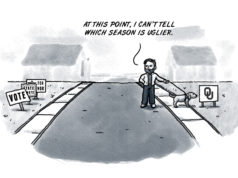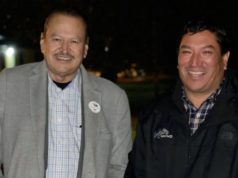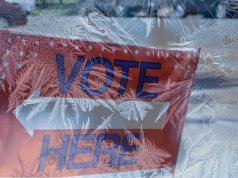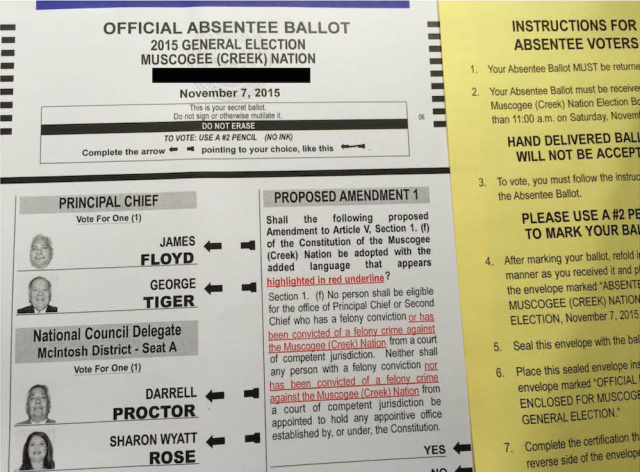

The Muscogee (Creek) Nation’s legislative body formally requested international election monitors from the Carter Center for this year’s principal chief election, which concludes Saturday.
But Carter Center staff told NonDoc that conversations they had indicated that incumbent Principal Chief George Tiger did not support the “electoral observation.” Support from all candidates is a requirement before the Carter Center will agree to send election monitors, said Brett Lacy, an associate director of the center’s Democracy Program.
“I think I can say that although Principal Chief Tiger indicated to us that he doesn’t object to our involvement directly, (through) the combination of our conversation with him and conversations with the (Muscogee Creek) National Council, it became very clear to us that Principal Chief Tiger is not supportive of us playing a role,” Lacy said.
Tiger said that wasn’t true.
“I was never totally against them coming,” he said. “Period. Exclamation point.”
Elected chief in 2012, Tiger’s relationship with the nation’s National Council — on which he served from 2010 to 2012 — has been tumultuous.
In March, the tribal council voted 12-0 to ask for Tiger’s resignation following a Tulsa World investigation of his personal contractual relationship with a casino developer.
“I think that resolution kind of spoke for itself,” said current National Council Speaker Thomas Yahola. “But that resolution was the result of citizens’ concerns. That’s how that came about.”
Principal chief election
Tiger is being challenged in a runoff for the principal chief position by James Floyd, a former director of a Veterans Administration Medical Center in Muskogee.
Floyd said public concern of the election’s legitimacy led him to ask the National Council to consider a resolution requesting the Carter Center’s monitoring efforts. He said more than half of all candidates signed in support.
“Several of them felt they were being intimidated. They were afraid to speak up because they were being told to be quiet,” Floyd said. “Some were employees of the tribe, and they felt they had a lot to lose if they did anything.”
When the tribal council passed the resolution requesting a neutral third-party election observer, Yahola said it went to Tiger’s desk. By law, a principal chief can sign the legislation, veto it or take no action. If he takes no action, the legislation takes effect after 10 days.
“The last option is what he decided to do,” Yahola said. “The actions of the principal chief not signing it immediately gave [the Carter Center] the indication that he was not in favor of it at all. So I believe that was the reason they declined our invitation.”
Tiger offered NonDoc several reasons he did not sign the resolution: because the nation has its own Constitution; because he was concerned about meeting Carter Center time frames; because it would be easier to coordinate during the next election.
“By not signing it, I wasn’t saying I was against it,” Tiger contended.
Anonymous mailers could be violations
Seasoned political operatives likely know an old saying: “There are only two times to go negative in a campaign — when you’re ahead, and when you’re behind.”
Tiger’s campaign may be benefiting from anonymous campaign mailers that portray Floyd in a negative light, though the principal chief himself said he is not behind them.
“My feeling is that I only control what I control. What anybody else sends out, I don’t control that,” Tiger said.
Asked if he knew who might be sending the mailers on his behalf, Tiger said no.
One particular mailer is made to look like it came from the Muscogee (Creek) Nation’s election board.
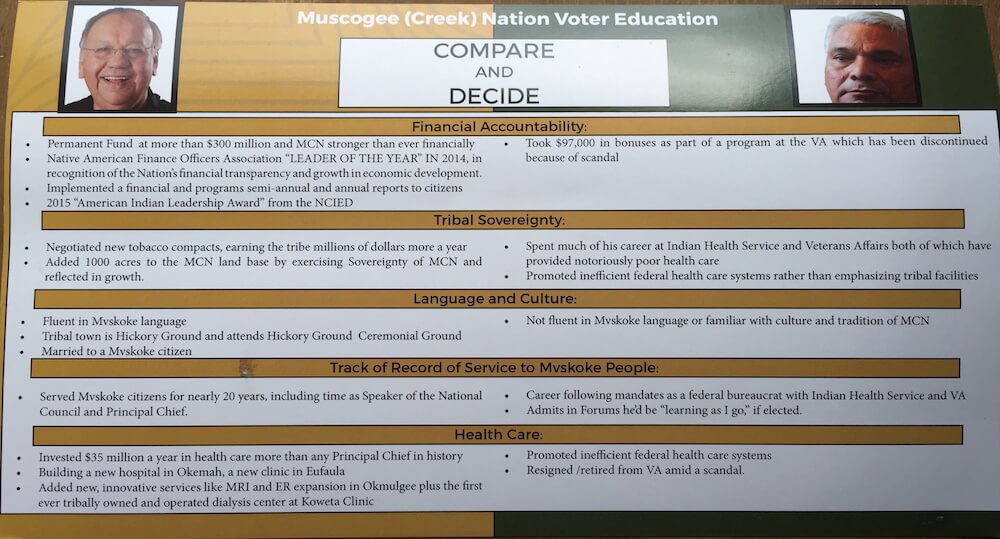
Text on the opposite side of the mailer reads:
Muscogee (Creek) Nation Voter Education. Absentee ballots must be returned before Election Day, November 7. If you have questions regarding your Absentee Ballot, contact the Muscogee (Creek Nation Election Board at: (918) 732-7631.
“Who’s to say it didn’t come from the other camp?” asked Tiger, who is described glowingly on the mailer.
Floyd, who is criticized in the mailer, said he filed a complaint with the election board regarding the flier, which contains no return address or indication of who paid for it.
“It looked like it came from the Election Board. It certainly looked like it to the average person,” Floyd said. “I thought it was a very clear violation, and I think they should investigate it and pursue it.”
Floyd said he has filed three other complaints with the election board since the Sept. 19 primary where he received 1,282 votes to Tiger’s 1,179. Three other candidates, including Yahola, split 2,255 votes between them, forcing the runoff. The nation has about 79,000 members but only about 17,000 registered voters.
“Voters were mistakenly thinking this is an official document or official mailer from the election board, and it puts them in a bad light,” Floyd said. “They’ve received complaints by phone, by people coming in.”
Tiger said he believes the election board does a fair job.
“They’re an independent entity. I don’t get involved in what they do,” he said. “There are some things that need to be improved upon, and those things can be done through legislation by the council.”
Floyd said how the election is playing out proves that the Creek people need change, which is why he was motivated to run.
“They had lost trust in their own government and felt there needed to be a change,” he said. “(I’ve seen it) firsthand, with a mother who is in her 80s and trying to get help from the tribe and finding out how difficult it was.
“We need to restore integrity back in the tribe and treat citizens with compassion and respect them.”
Tiger cited several reasons that he is the best choice for chief, namely the tribe’s recent economic growth, its health care expansions and his ability to speak the Mvskoke language. All of those points are also noted on the anonymous mailer pictured above.
‘It was the weirdest shit’
Lacy said the Carter Center has declined to monitor elections previously when certain parties or individuals don’t offer full support of their involvement. She mentioned elections in Ethiopia and Sudan as examples.
“We’ve identified a number of international human rights that we believe apply to elections,” she said. “We also will analyze an electoral process, and we make recommendations at different stages when improvement might be necessary to (help meet) certain standards for a democratic election.
“There are also times when the presence of international observers can play a role in deterrence of any potential intimidation or electoral fraud that may happen around an election day. We believe it is an international right of people to cast their votes in secret in an election,” she said.
Multiple tribal members — including Floyd and Yahola — expressed concerns to NonDoc that their votes might be made public and might be used as grounds for political retribution. No one NonDoc spoke to except Tiger expressed trust in the election board’s impartiality.
“I think they can be influenced,” Yahola said. “That’s about all I can say. It’s just my feeling, that’s all.”
Lacy said the Carter Center has monitored tribal elections in the state of Oklahoma previously for the Cherokee Nation, once in the 1990s and once in 2011.
The Center’s report on the 2011 election can be found here. It found the election to be fair but made seven recommendations for improvements.
One political operative who worked on that 2011 election said he finds the drama surrounding the Creek Nation’s current election unsurprising.
“Native politics are the most baffling thing ever,” he said on the condition of anonymity. “We had guns in our office. We had death threats. It was the weirdest shit.”
The operative has also done political work in the Muscogee (Creek) Nation and spoke to Tiger’s potential advantage.
“It’s beneficial to be the incumbent always, but it’s very beneficial to be a sitting incumbent in a tribal race, because your people oversee the election,” he said. “There isn’t an independent election arm.”
Lacy said tribal races pose a “unique set of challenges.”
“Elections in Native America are complicated,” Lacy said. “Sometimes there’s legal framework that has to be resolved. Sometimes there’s questions about membership and voter eligibility that need to be resolved.
“It would be great if there were more resources targeted to meet those challenges.”









